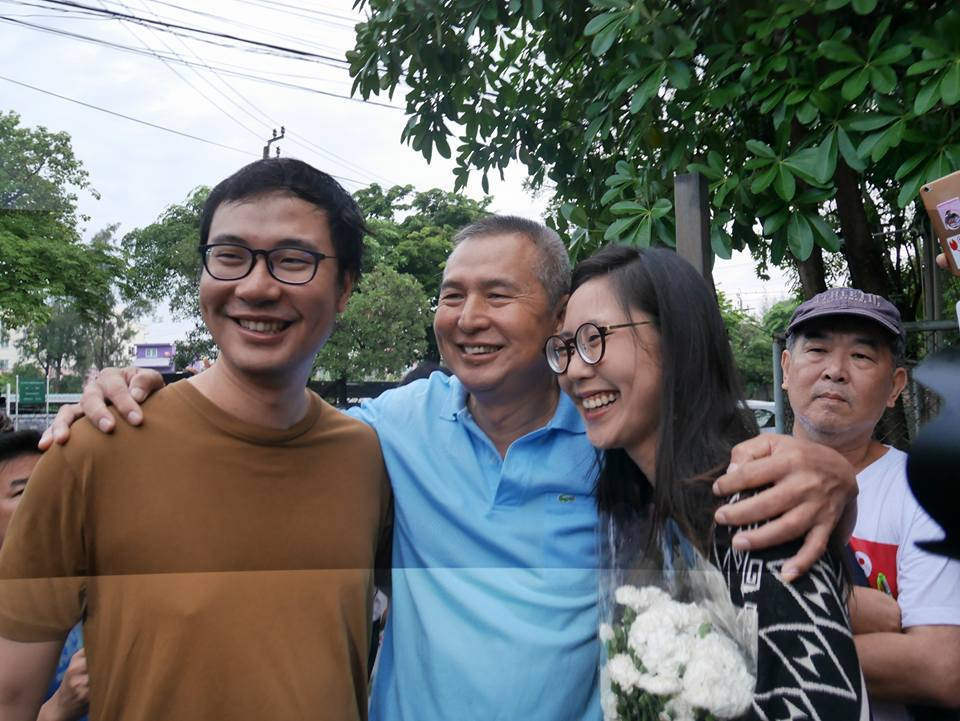Smiling and laughing as he recalled his first suicide attempt, the 57-year-old lèse majesté convict told the story of his seven lost years behind bars.
On 30 April, 6 am, Somyot Pruksakasemsuk, a royal defamation convict, was released from Bangkok Remand Prison after seven years of imprisonment. Although he looked tired, he refused to take a rest and agreed to give an interview.
“It’s ok. I have been resting for seven years,” said Somyot.
His release was done in a rush as the prison want him to avoid talking to the public as much as possible, Somyot added. Right after he stepped down from the sleeping cell, he was freed. The prison also offered to take him home directly, but he refused as he wanted to greet his supporters, as well as his beloved children, who had been waiting for him since 4 am.
Somyot, 57, was a long-time labour and democracy activist. From 1977, Somyot was active in campaigning for the right of association of labour unions and the minimum wage. After the 2006 coup d’état, Somyot’s political stand and activism became more intense. He began to take part in anti-coup activities for democracy and in late 2009 became a crucial member of the United Front for Democracy Against Dictatorship (UDD), the main faction of the anti-establishment red shirt movement.
After the violent crackdown on the red shirt demonstration in April-May 2010 which killed nearly 100 people, Somyot and his political group kick-started a campaign in 2011 to collect 10,000 names for the abolition of Article 112 of the Criminal Code, the lèse majesté law. He reasoned that the law was being used as political tool. On 30 April 2011, five days after the group started the campaign, Somyot was arrested for lèse majesté.
During his seven-year long imprisonment, Somyot was like a complainer for other inmates facing difficulties, partly because everyone saw him as a stubborn fighter against unfair regulations of the prison. In June 2014, he filed a complaint with the National Human Rights Commission (NHRC) against the prison rule that barred inmates from reading newspapers. In October 2017, he submitted another petition to the NHRC about the prison providing inmates with only three small blankets for sleeping without any pillow and bed.
Recently, he also petitioned the Administrative Court to revoke the new commutation regulation imposed after 2014 coup. He explained that previously, inmates who behave properly according to the rules of the Correction Department could request commutation and the prison had the authority to approve it. But after the coup, all the requests have to be approved by the Department, making numerous political prisoners, including Somyot himself, miss the chance of having their sentence commuted as their requests were stuck in red tape.
After the petition was filed in court, the prison offered to release him in March, which would be a month earlier than his official release, in exchange of having the petition withdrawn. But he refused.
“There are many people suffering discrimination on this issue. If I fight and win, it will later be good for others,” Somyot stated.
He was not only a complainer but also a Department of Public Welfare for other prisoners. As Somyot was in Section 1 of the prison, new inmates would have a chance to see him, and he always helped them, both physically and mentally, in starting a new life behind bars. He usually asked his friends outside the prison to buy necessary items such as toothpaste, toothbrushes and soap for prisoners who have no money or family.
“Sometimes, he repeatedly asked me to buy new dippers. He said that when he took a bath and washed his face, in a blink of an eye, his dipper bowl was gone (laughter). So he had to adapt. When he washed his face, he put the dipper between his legs,” said Luktan (pseudonym), a friend of Somyot’s who bought items for him for the past seven years.
Somyot recalled his memories in jail with a smile and a laugh, even when he talked about one of his most traumatic memories — his suicide attempt. In the early years of his imprisonment, he was overwhelmed, not by grief or despair, but anger — the anger at the fact that his bail requests were repeatedly rejected.
“I merely fought for the right to bail according to the constitution, but I didn’t get it. I thought that freedom is important and if it’s important, it has to cost a life. I didn’t know how to fight, so I would exchange my life to see freedom again. Many redshirts had sacrificed their lives, so just go with them, that’s what I thought at the time,” Somyot said.
He wrote his reason for suicide in a letter and planned to hang himself to death at 2 am when most inmates were sleeping. But as he was tying his pha khao ma (a Thai-style cotton wrapper) to the jail bars, an inmate woke up and stopped him. He was forbidden to use a pha khao ma since then. After the failed suicide, the prison sent various psychologists to talk to him and installed CCTV around the jail. Also, he had to take sedatives for three months.
After he adapted to his new life behind bars, he started to find some activities to kill time and boredom. He was in charge of the prison’s library which allowed him to read books and newspapers, even though they were a couple of days late. He liked to hold a discussion group among prisoners in the library. The discussion was so sensitive that wardens decided to move all lèse majesté prisoners who talked to Somyot other sections.
Another activity that he loved was Cambodian language classes with Cambodian inmates. Most of them were jailed for drug offences or illegal entry. In some cases, their Thai employers were the ones who called the police to arrest them merely to avoid paying their wages.
“95 percent of people here is a good man but poor. They have nothing to eat. So what can they do? Sell drugs of course,” Somyot added.
He further added that some government officials offered to help him, and other lèse majesté inmates, get out of jail. All he had to do is to simply “give up” and plead guilty, but again he refused.
This was not the first time Somyot was told to confess to a crime that he did not commit. When he was arrested in 2010, the authorities repeatedly tried to convince him to say that he received financial support from Thaksin Shinawatra to publish a magazine that constituted royal defamation. Of course, he refused.
It remains unclear whether Somyot will continue his campaign to amend Article 112 or not because his main concern now is to recover his health. He walked out from the bars with gingivitis since he saw a dentist only once during the past seven years in jail and his liver has been damaged from taking too many painkillers.
Despite his health problems, he promised to write a book, but now he just wanted to enjoy the freedom he just received.
prachatai





